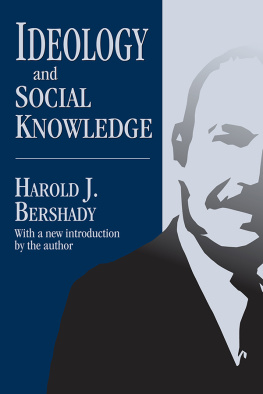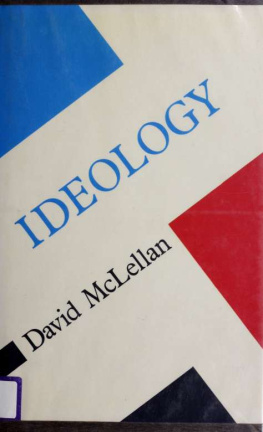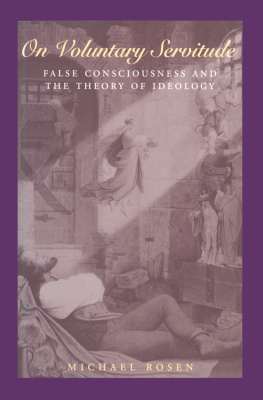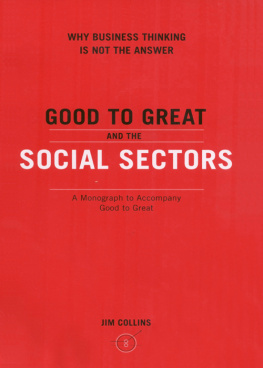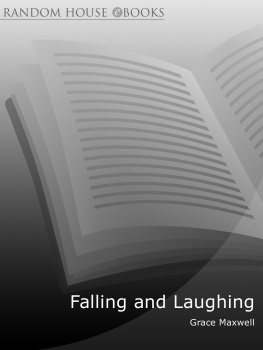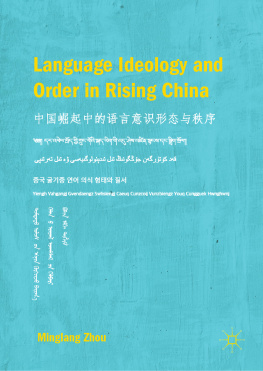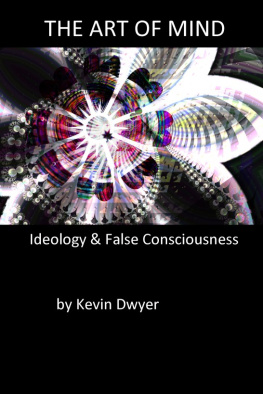LANGUAGE, IDEOLOGY AND SOCIAL CONSCIOUSNESS
Language, Ideology and Social Consciousness
Developing a sociohistorical approach
CHIK COLLINS
Department of Applied Social Studies
University of Paisley
First published 1999 by Ashgate Publishing
Reissued 2018 by Routledge
2 Park Square, Milton Park, Abingdon, Oxon OX14 4RN
52 Vanderbilt Avenue, New York, NY 10017
Routledge is an imprint of the Taylor & Francis Group, an informa business
Copyright Chick Collins 1999
All rights reserved. No part of this book may be reprinted or reproduced or utilised in any form or by any electronic, mechanical, or other means, now known or hereafter invented, including photocopying and recording, or in any information storage or retrieval system, without permission in writing from the publishers.
Notice:
Product or corporate names may be trademarks or registered trademarks, and are used only for identification and explanation without intent to infringe.
Publishers Note
The publisher has gone to great lengths to ensure the quality of this reprint but points out that some imperfections in the original copies may be apparent.
Disclaimer
The publisher has made every effort to trace copyright holders and welcomes correspondence from those they have been unable to contact.
A Library of Congress record exists under LC control number:
ISBN 13: 978-0-367-13482-2 (hbk)
ISBN 13: 978-0-367-13483-9 (pbk)
ISBN 13: 978-0-429-02676-8 (ebk)
Contents
This book is based on D.Phil, research which was undertaken at the University of Paisley. I would like to thank the University for awarding the Studentship which allowed me to undertake that research. A debt of gratitude is owed to Professor John Foster of the Department of Applied Social Studies who was both tolerant and generous in supervising my research. Dr. Charles Woolfson of the University of Glasgow was, as second supervisor, also of great assistance. Thanks are also due to my fellow research students - particularly Erik Sutherland and Ricky Devlin - and other colleagues in the Department of Applied Social Studies - particularly Darryl Gunson, Chris Madigan, Andrew Eccles, John Rodger; Brian Slocock; Hugh Maguiness, Tony Clarke, Mike Turner and David Kennedy.
I would also like to thank those people other than my supervisors and immediate colleagues who have taken the time to read and comment on parts of this work at some stage in their development. My brother David Collins, together with Mike Huspek and Colin Barker, all made much-valued contributions, as did: Hannah Bradby; Allan McConnell; Jacob Mey; Martin Barker; Jim Lister; James Wertsch; Lois Holzman; Mae Shaw; and Joan Kelly Hall. Andy Robinson provided assistance in proof reading the manuscript.
Critical reflection on language and its relation to ideology and power has become increasingly central to social theory in recent times. Indeed a concern with discourse seems progressively to colonize the social sciences as a whole. For those whose engagement with the social sciences is conducted from a historical materialist perspective, and is motivated by questions to do with class and class struggle, this development might appear as a double-edged sword. On the one hand the newer trajectory might seem to have the potential to offer insights into the processes of subjectivity and consciousness which are of vital interest to them. On the other hand, it has seemed that the linguistic or discursive turn has often been of a distinctly non-materialist bent, and that it has tended strongly to proceed at the expense of a concern with questions of class and class struggle. Indeed, more than this, for some writers it has precipitated a fashionable cult of absolute relativism, and threatened to undermine what they see as the kinds of coherent thought that can actually lead to the emancipation of humanity (Palmer 1990: xiii-xvi, see also McNally 1995).
In this situation there is a clear danger. It is that those who perceive the linguistic or discursive turn in these terms might neglect to explore more fully the ways in which a focus on language might complement and enhance, rather than undermine their own project - the baby, as it were, being thrown out along with the rather murky bathwater. It is in light of this perceived danger that I have sought to make a contribution in this book. I set out to develop an approach to critical reflection on language which does offer insights into the processes of social consciousness which are of vital interest to those who adhere to a historical materialist perspective and who are concerned with questions of class and class struggle. Moreover I set out to do this in two quite particular ways.
Firstly, the book focuses in particular upon the work of two Soviet Marxists of the 1920s and early 1930s. The first of these is L.S. Vygotsky who is known primarily as a psychologist, but whose central concern was the investigation of human consciousness. The second is V.N. Voloshinov, a member of the so-called Bakhtin Circle and, by his own description, primarily a philosopher of language. The works of these writers have become increasingly well known in Europe and America - particularly over the last decade. However, they seem to have seldom been applied in ways which one might expect the works of such authors to be applied, and this means that the insights which they might have to offer in relation to the concerns of this book have not been sufficiently explored. Something of an industry has developed around the work of Vygotsky. But for the most part this has involved appropriating him as a developmental psychologist who offers some important insights about the social and linguistically mediated nature of the process by which consciousness develops in childhood - and who can thus be seen to be offering an alternative perspective to the previously dominant Piagetian paradigm in that field. Voloshinov, on the other hand, has often been appropriated as an appendage to his colleague Bakhtin, and the latter has overwhelmingly been seen as a literary theorist and critic, or as a philosopher of language whose main interests were of a literary kind. In both cases there have been only quite limited attempts to assess the broader significance of their contributions to our understanding of processes of language-use and social consciousness in relation to studies of class struggle in capitalist societies (though see M. Barker 1989; Foster 1985; Huspek 1988a; McNally 1995; Pred 1989; Wertsch 1985a, b, 1991; Woolfson 1976). It is in light of this apparent gap between the potential to develop an approach to these processes on the basis of the contributions of Vygotsky and Voloshinov, and the actual ways in which their contributions have so fer been appropriated, that this work focuses most centrally on these theorists. However, this does not mean that the contributions of other writers are excluded, and the works of a number who would seem to have something of value to offer in relation to the task in hand are given detailed attention at various stages. The main writers selected for these purposes are James C. Scott, John Foster, Norman Fairclough, Michael Huspek, Charles Woolfson and James V. Wertsch.
Secondly, the manner in winch I seek to develop an approach to processes of language and social consciousness in this book might itself be considered somewhat Vygotskian. As Kozulin notes:




